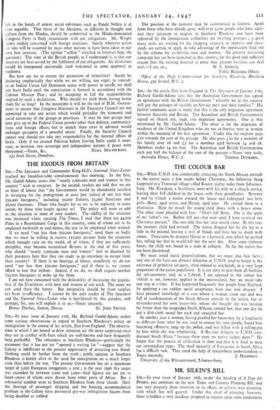SIR,—In your issue of. January 17th, Mr. Richard Gould-Adams makes
some curious observations in regard to Southern Rhodesia's policy on Immigration in the course of his article, Exit from England. The observa- tions to which I am bound to draw attention are the more surprising since they are in conflict with facts which are well-known and have frequently been publislItd. The references to Southern Rhodesia—particularly the statement that it has not yet " opened a waiting list "—suggest that the Colony is indifferent to the present opportunity of attracting new blood. Nothing could be farther from the truth ; public opinion in Southern Rhodesia is keenly alive to the need for immigration on a much larger scale than before the war. The present Government has set a minimum target of 5,000 European immigrants a year ; in the year 1946 this target was exceeded by between 2,000 and 3,000—final figures are not yet to hand—most of whom were drawn from other parts of Africa. But a substantial number went to Southern Rhodesia from these islands. Only the shortage of passenger shipping and the housing accommodation problem in the Colony have prevented pre-war immigration figures from being doubled or trebled
The position at the moment may be summarised as follows: Apart from those who have already gone, well over 3,000 people who have signi- fied their intention to migrate to Southern Rhodesia and have been approved by the immigration authorities are awaiting passages ; a great many more are waiting for the shipping situation to improve and thou- sands are certain to apply to take advantage of the opportunity held out by the scheme for ex-Service men and women. No positive recruiting campaign has yet been launched in this country, for the good and sufficient reason that the existing demand is more than present facilities can deal Public Relations Officer.
Office of the High Conunissioner for Southern Rhodesia, Rhodesia House, 429 Strand, W.C. 2.


































 Previous page
Previous page